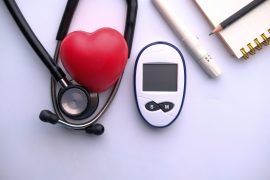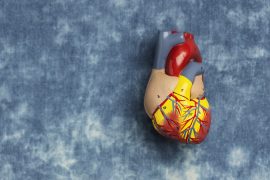Heart disease today is one of the leading cause of death for both men and women worldwide. Cardiovascular health means the health of the heart and blood vessels. We have to lead a healthy lifestyle and take steps to lower the risk of developing Cardiovascular diseases (CVD). A healthy lifestyle, in addition to staying active and eating nutritious meals also includes taking care of your heart and arteries. By implementing the right and healthy habits into your daily life, you can prevent CVD and reduce your risk even further. This article will discuss the ways to keep your heart healthy and reduce your risk of heart disease. Keep reading to learn more!
Know your Risks
Since anyone can get heart disease, cardiovascular health goals start with identifying if you have the following risks:
- Diabetes
- Hypertension or High Blood Pressure
- High Cholesterol
- Obesity
- Lack of physical activity
- Poor eating habits
- Smoking and Drinking
- Family history of heart disease
How To Achieve Cardiovascular Health for Everyone
Since cardiovascular health is a concern for almost everyone, we have to look into all factors like hereditary conditions, lifestyle habits like drinking and smoking, and socio-environmental contributors like air pollution, stress, and our sedentary lives. To live with a healthy heart and avoid the risk of cardiovascular problems, you must-
Eat a Heart-Healthy Diet:
Eating a heart-healthy diet is one of the best ways to keep your heart healthy and reduce your risk of CVD. Heart-healthy foods are low in saturated fats and sodium and are high in nutrients such as fiber, vitamins, and minerals. Heart-healthy foods include fruits, vegetables, whole grains, and low-fat dairy products. Healthy eating is not just about cutting calories but also about getting the right balance of nutrients. Heart-healthy eating is not only about what you eat but also how often you eat it. Eating too little or too often throughout the day is unhealthier and can lead to an unhealthy heart.
Exercise Regularly and Get Active:
A healthy diet is great, but exercise is even better for cardiovascular health. Exercise has numerous health benefits, including lowering cholesterol and blood pressure and increasing HDL (good) cholesterol. It can also reduce your risk of Type 2 diabetes and increase your life expectancy by years. The best part about exercise is; you can do it at any time, place, and with almost any equipment. Whether walking on the treadmill or cycling with your stationary bike, activity can benefit your heart health in many ways and improve your quality of life.
Maintain the Right Weight:
By eating the right food and exercising well, we also have to pay attention to our weight. Being overweight and on the wrong side of the scale is not a good sign. Obesity is one of the risk factors for CVD.
Take a Daily Dose of Vitamin D:
While many people know that they need to eat vitamin-rich food to maintain a healthy body and heart, many are unaware that they also need to take a daily oral supplement to get the same benefit. The human body needs Vitamin D to function properly, and it also plays a crucial role in regulating blood pressure, improving bone health, and strengthening the immune system, which is all crucial for cardiovascular health. The best way to get vitamin D is to get outside and sun exposure every day. Unfortunately, that isn’t always possible. That is why a daily supplement is also an option. However, it is advisable to not self-medicate and always consult your doctor and follow his advice and instructions before taking any Vitamin D supplements. Doctor-recommended dosage of Vitamin supplements helps make good the vitamin deficiency in your body in the right way.
Don’t Smoke or Hold Onto Your Breath:
Smoking, exposure to second smoke, and holding your breath can damage your heart and arteries. Smoking is linked to a number of health issues, including heart disease. People who smoke are at a higher risk of CVD because of the damage done to the body by smoking. Holding your breath for too long is also harmful to your heart. Short-term moments of holding your breath, such as swimming underwater or blowing out birthday candles, are not harmful. However, holding your breath for an extended period, such as while performing complicated tasks or playing sports, can damage your heart and arteries.
Consult your doctor for timely and proper treatment if you have any signs of CVD, like chest pain, chest heaviness, shortness of breath, pain or numbness in the legs or arms, fatigue, or dizziness. Seeking immediate medical attention and intervention can save you from significant heart complications.
Conclusion
Heart disease is a severe problem that affects millions of people worldwide. It is one of the most common causes of death in the world. The good news is that it can be prevented with a few simple lifestyle changes. Eat a healthy diet, exercise regularly, take doctor-recommendeddaily vitamin D dose, and don’t smoke or hold onto your breath. These few lifestyle changes will significantly lower your risk of heart disease. Keep these tips in mind, and you will be on your way to a heart-healthy lifestyle!
FAQs :
1. What is cardiovascular health?
Cardiovascular health means the health of the heart and the blood vessels.
2. What are five ways to improve your cardiovascular health?
Five ways to improve cardiovascular health are-
- Leading an active lifestyle with regular exercise and walking to keep the heart active and healthy
- Avoiding smoking and drinking, which can weaken and damage the heart
- Eating heart-healthy foods and not indulging in overeating
- Maintaining the right weight, which means avoiding being overweight
- Not to take any stress
3. What is good for cardiovascular health? Any moderate physical activity like walking, running, cycling, swimming, or a game of tennis or badminton and skipping for at least 150 minutes per week is good for the heart.
4. What are the five major cardiovascular health problems?
Five major cardiovascular health problems are,
- Heart attack aka coronary artery disease
- Heart failure
- Stroke
- Arrhythmia
- Heart valve complications
5. What triggers cardiovascular disease? Risk factors like poor and unhealthy diet, lack of exercise and physical activity, smoking and drinking, high blood pressure, diabetes, obesity and overweight, and high cholesterol trigger cardiovascular disease.





Comments are closed.